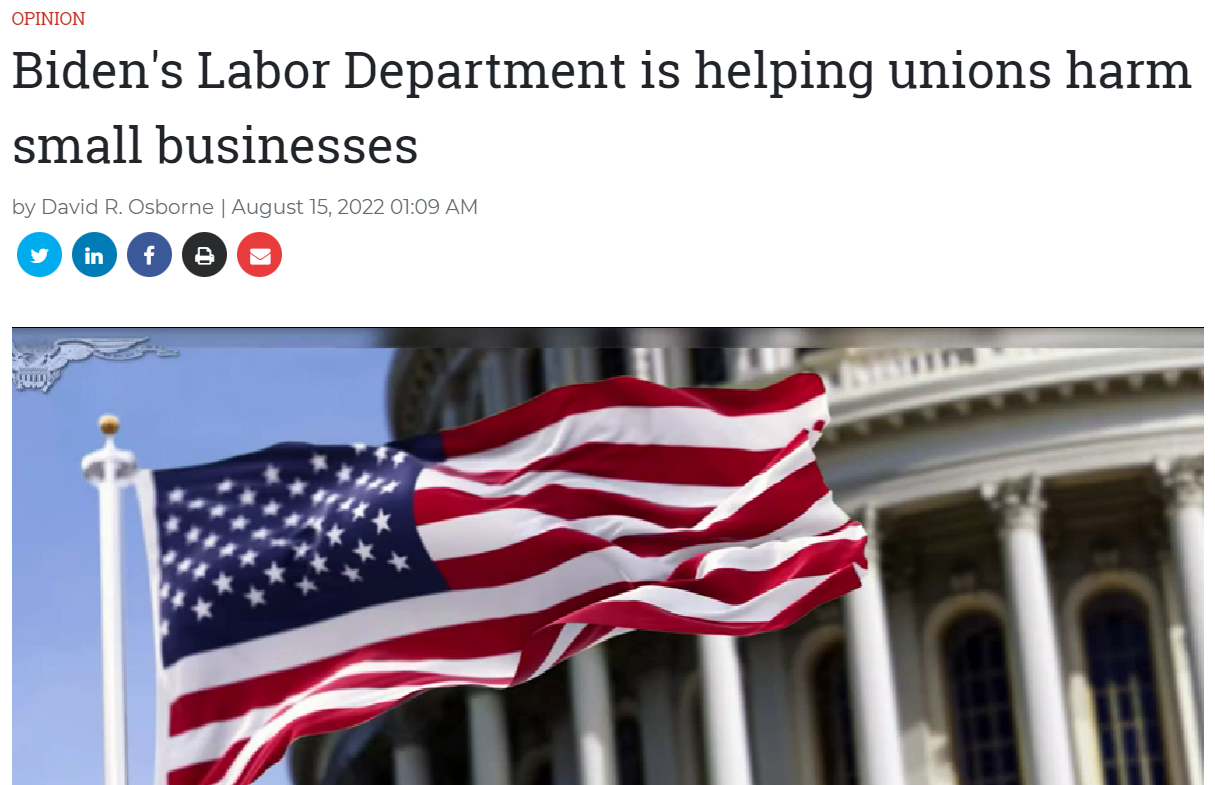Americans for Fair Treatment CEO, David Osborne, was featured in the Washington Examiner:
George Shearer was shocked to receive a petition from the Teamsters seeking to unionize his family’s truck delivery business. The business was not incorporated, and although his father started and still owned it, his father remained a full-time truck driver as well. They had just nine employees, and three of them were Shearer’s close friends.
None of these employees had been dissatisfied with their jobs. But Teamster recruiters were telling drivers they could nearly double their salaries through collective bargaining. This was clearly impossible — not even Shearer, who drove trucks in addition to managing the business, made the kind of money the drivers were seeking. It was a niche business with a lot of overhead.
Shearer wanted to be honest with his employees about the Teamsters’ demands. He invited the drivers who had been recruited by the Teamsters over for dinner. He explained that these demands would put him out of business, that it would be “killing the goose that laid the golden egg” to get paid what the Teamsters wanted, and literally opened the books so the drivers could see the finances. By the end of the evening, Shearer wasn’t sure if anyone had changed their minds, but he thought the discussion was productive.
Instead, Shearer got hit with unfair labor practice charges, in part for his meeting with the drivers. The business was paralyzed, and nearly bankrupt, by the ensuing National Labor Relations Board proceedings. Although employees eventually won the unionization vote, they never got close to the pay hike the Teamsters promised.
Shearer’s dinner meeting took place in 1978, and in the nearly 45 years since, the NLRB’s treatment of meetings like this hasn’t changed much. The NLRB determined this meeting was an unfair labor practice because it had the effect of dissuading employees from unionizing. And while a labor lawyer may have spotted the potential for liability here, Shearer thought he was dealing fairly with his employees. After all, as Shearer explained before the NLRB, doubling their pay would “put him out of business, therefore [the employees] would be hurting [them]selves.”
But it may be getting worse for everyone involved: NLRB General Counsel Jennifer Abruzzo is pushing to have the NLRB apply even harsher standards when employers talk to their employees about unionization.
Already, employers increasingly choose to communicate with employees in tightly orchestrated meetings during working hours at which they can only make low-risk, even obvious statements such as “a union cannot promise you a pay raise.” They often hire expensive consultants to make sure they aren’t breaking the rules.
That’s what makes Abruzzo’s efforts to eliminate these “captive audience” meetings so outlandish.
Labor law is complicated, and unions will only tell employees one side of the story. When employers hold meetings for employees, it is often the only reliable source employees have about their rights. Yes, employers will tell their side of the story, but it’s an important complement to what employees hear from union officials.
Abruzzo’s efforts are in stark contrast to what union recruiters demand from public employers. While union officials need the NLRB’s help to gain new recruits in the private sector, they already have every advantage recruiting new members in the public sector with “captive audience” meetings of their own.
By getting politically involved, unions have turned public employers — the government — into their best union recruiters. At the bargaining table or through the legislative process, unions get government employers in union-friendly states to grant unsupervised access to employee orientations, making joining a union look like a required part of the job. Some governments even place union recruitment materials and membership cards in folders with mandated employee paperwork.
For instance, at the behest of public-sector unions, New York lawmakers passed a law in 2019 giving union officials the right to meet with new government employees for up to an hour. In other states, including California and Maryland, lawmakers have likewise given unions access to orientation sessions for new hires and to existing union members’ personal information.
In this sense, it’s public-sector unions that deserve the skepticism Abruzzo trains on private-sector employers. It’s the unions’ “captive audience” demands in the public sector that hurt employees most.
It isn’t too late for state lawmakers to do the right thing. Campaigns are underway in Pennsylvania and at least six other states to make sure public employees receive balanced, accurate information — that they can choose to join a union, but that they can also say no thanks to union membership.
David R. Osborne is CEO of Americans for Fair Treatment, a community of current and former public-sector employees offering resources and support to exercise their First Amendment rights.
